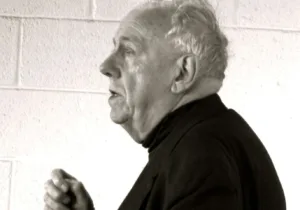Rediscovered Notes on the 75th Anniversary of The Uneasy Conscience Reveal Convictions of Carl Henry
If you were to walk into the pastor’s study of Metropolitan Baptist Church (today Capitol Hill Baptist Church) at 9:30 on any given Sunday morning in 1962, you would encounter a surprising array of figures: Senators A.T. Robertson (D-VA) and Strom Thurmond (D-SC), military generals Charles R. Landon and Paul C. Watson, National Right to Work President Reed Larson, evangelical theologians Clyde W. Taylor and Carl F.H. Henry, and several other prominent businessmen and attorneys. The group, called together by Carl Henry, gathered each Sunday between 1962 and 1964, for an exclusive Sunday School class that applied the Bible to pressing social problems. Chief among these being Communism.
Henry’s unpublished notes, recently discovered in the archives of Capitol Hill Baptist Church, show how he viewed Communism, not only as a threat, but as an opportunity. For Henry, the rise of Communism, coupled with liberal Protestantism’s impotency to thwart its ascendancy, demonstrated the need for biblically grounded Protestantism in public life. In its view of creation, history, and revelation, Protestant liberalism had paved the way for Marxism. If America was going to survive and resist the spread of Marxist ideology, it would not happen through liberal Christianity, but through a recovery of the doctrinal core of historic Christianity.
As Henry surveyed the spread of Marxist ideology at home and the advance of Communist armies abroad, he laid the blame, in part, on liberal Protestantism’s view of creation, history, and revelation. Firstly, by mythologizing the Book of Genesis in order to accommodate evolutionary theory, Henry argued that liberals had undermined the “original structure of creation.” This played into the hands of Marxism, which denied God’s existence, and consequently, his all-encompassing authority as Creator. As a result, when Communism demanded an absolute concentration of power in the State for achieving its utopian ends, liberal Protestantism had little theological capital to resist.
Evangelicals, on the other hand, insisted that, as Creator, all power belonged to God. Thus, any attempt at concentrating absolute power in the hands of any man constituted a direct attack on God’s authority as Creator. For Henry, biblical history proved that “God frustrates and destroys nations that seek arbitrary dominion over the earth.” The same would be true of Communism.
Secondly, Henry argued that liberal Protestantism’s denial of God’s miraculous intervention in history made them susceptible to mechanistic notions of historical inevitability, a key presupposition of Marxism. By abandoning “the historical manifestation of God in Christ” and “tending to view the historical Jesus as non-supernatural,” or by “distinguishing the Christ of faith from Jesus of Nazareth,” liberals treated the universe as a “closed system,” void of the intervening power of God. For Henry, however, there was no such thing as ‘historical inevitability’ other than that revealed in Scripture. Namely, “that the Lord of history has preordained world judgment, vindication of his righteousness, and the eternal blessedness of the redeemed.” Unlike liberals, evangelicals never worried about being “on the wrong side of history.” They worried only about being on God’s side in history. Sadly, Henry lamented “our policy-makers are subconsciously gripped by the notion of historical inevitability” due to “liberal disbelief in transcendent values and commitment to evolutionism.”
Thirdly, and finally, liberal Protestantism’s denial of God’s inerrant revelation in Scripture removed the absolute standard by which history and ethics is to be judged. As Henry explained, “Its rejection of intellectual revelation strips liberal Protestantism of an authoritative exposition of the nature and will of God so that it must rely mainly upon conceptions of social ethics (which liberalism also fails to ground in an assured basis of revelation) in confronting Communist theory.” In other words, in the absence of an absolute standard, liberal Protestants were forced to resort to assessing morality on the basis of the harm principle (i.e. social ethics). This made them especially susceptible to equating justice with equality and love with license. As Henry summarizes the matter succinctly, “Liberal Christianity confused the Marxian classless society with the Biblical kingdom of God as a penalty of the loss of supernaturalism and acceptance of evolution.”
In these three areas—their doctrines of Creation, History, and Revelation—liberal Protestantism was woefully inadequate to counter Communism. The only alternative lay in a return to the historic Protestant fundamentals embodied in the burgeoning evangelical movement.
Since evangelical Christianity was the only viable antidote to Communism, Henry’s concern was for evangelicals to vigorously articulate a public evangelical Christianity as the only coherent worldview alternative to Marxism. Protestant liberalism would not cut it because it was part of the problem. Since Christianity contained a “way of looking at the world, at history, at man,” it must be presented as such. Not just as “a way to get saved,” but as a worldview in direct opposition to Communism.
As we mark the 75th anniversary of the publication of Carl F.H. Henry’s The Uneasy Conscience of Modern Fundamentalism in 1947, let us resolve to continue the urgent task of articulating the ‘world-life view’ of biblical Christianity. Yes, preaching and sharing the gospel will always be the primary task of the church, but preaching must always be done, as Henry put it in 1947, “in the interest of individual regeneration by the supernatural grace of God, in such a way that divine redemption can be recognized as the best solution of our problems, individual and social.” Anything less is evangelistically and biblically insufficient.
Bibliography:
1 Notes from Hilltoppers Communist and Christian view of History, 1962, MS-1887, Box 11, Folder 03. Hilltoppers. CHBC Archives, Washington D.C.
2 Christian Understanding of Power, MS-1902, Box 11, 03. Hilltoppers. CHBC Archives, Washington D.C
3 Notes from Hilltoppers Communist and Christian view of History, 1962, MS-1887, Box 11, Folder 03. Hilltoppers. CHBC Archives, Washington D.C.
4 “A Christian Slogan” response to Communist Slogan, MS-1883, Box 11, Folder 03. Hilltoppers. CHBC Archives, Washington D.C.
5 “A Christian Slogan” response to Communist Slogan, MS-1883, Box 11, Folder 03. Hilltoppers. CHBC Archives, Washington D.C.
6 Notes from Hilltoppers Communist and Christian view of History, 1962, MS-1887, Box 11, Folder 03. Hilltoppers. CHBC Archives, Washington D.C.
7 Carl F.H. Henry, Notes on History, 1962, MS-1898, Box 11, Folder 03. Hilltoppers. CHBC Archives, Washington D.C.
8 Hilltoppers Outline on Christian Challenge to Communism Week 2, March 4, 1962, MS-1884, Box 11, Folder 03. Hilltoppers. CHBC Archives, Washington D.C.
9 Carl F.H. Henry, The Uneasy Conscience of Modern Fundamentalism (Grand Rapids, MI: Wm. B. Eerdmans Publishing Company, 1947).
10 Henry, Uneasy Conscience, 88.







 Live in the DC area? Sign-up for Providence's in-person events list!
Live in the DC area? Sign-up for Providence's in-person events list!